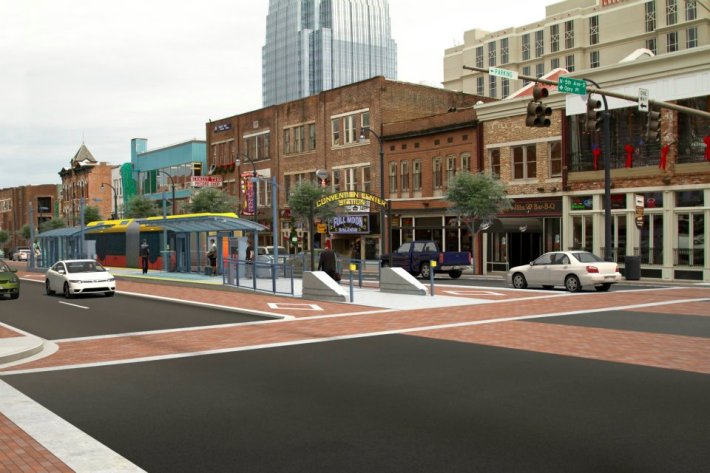Nashville, Tennessee, is trying to take its transit to the next level.

That ambition is most apparent in "the Amp," a proposed 7-mile bus rapid transit route linking East Nashville with downtown and parts of the city's West End. The project -- which is entering the final design phases -- would be built to a high standard, with 82 percent of the route running on dedicated transit lanes in the center of the street.
The route will give residents new options for getting around town without a car, especially the young people living in East Nashville, who are some of the project's biggest supporters. Nashville MTA has applied for federal New Starts funding, and advocates of the proposal are optimistic the $75 million will be awarded in February or March.
But as with any transformative transit proposal, there's some resistance. Part of that stems from everyday concerns from nearby residents and property owners -- questions about left turns and other design details. The other part is general resistance to change, as well as doubt that a city like Nashville can influence the way people move around.
A recent article in the Tennessean seemed to suggest the answer is to water down the proposal altogether. In a piece headlined, "Could there have been middle ground on Amp's center-lane design?," reporter Josh Brown writes:
Nashville never analyzed whether a bus line with the same mass-transit-style features -- such as stations with level boarding platforms and pre-purchased tickets -- would prove just as effective without the bus-only lanes.
Ed Cole, executive director of the nonprofit advocacy group Transit Alliance of Middle Tennessee, said he wouldn't support diluting the proposal, and that his goal is to "push the BRT concept as far as possible."
"It’s so easy for opponents to say, 'Just put more money into the bus system,'" he said. But that wouldn't lead to the same dramatic shifts in travel behavior as BRT would.
Cole said Brown is right on one count. The Nashville MTA never compared different BRT variations in the preliminary design phase. That process compared a streetcar, light rail, express bus, and BRT, eventually settling on high-quality bus service. Almost by definition, to be distinguishable from express bus service, BRT needs dedicated lanes in order to bypass traffic and offer a travel option that will compete with driving. Cole says that MTA will be examining different lane configurations in the final design phase, which is just beginning, and he notes that any portions operating in mixed traffic will involve a "performance tradeoff."
"People that would ride a more true BRT because it is reliable, frequent, faster -- those things don’t happen in just a [traditional] existing transit network," he said. "It's just not going to be attractive to a whole new generation of riders," if the bus is stuck in traffic and moving no faster than the alternative, he said.





